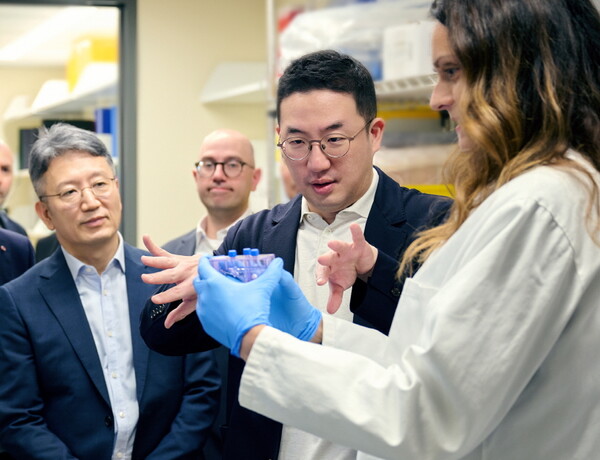
LG Group, a Korean conglomerate operating a wide range of business including electronics, chemicals, and telecommunications, has announced an intention to expand its bio business globally as a future growth engine.
Group Chairman Koo Kwang-mo, while reaffirming his will to develop innovative new drugs, expressed his ambition to make it the second battery business.
LG said Chairman Koo visited the U.S. four days last week to review strategies for fostering the bio and AI sectors and examine market trends in future business areas. Koo visited the Boston office of LG Chem's Life Science Headquarters, its U.S. subsidiary AVEO Pharmaceuticals, and LG Electronics’ AI Lab in Toronto, Canada, to check future businesses in the bio and AI fields.
Boston, a mecca for the bio industry, is home to more than 2,000 bio-related companies and research institutes worldwide.
In 2019, LG Chem's Life Science Headquarters also established a Boston subsidiary as an innovation center to introduce innovative technologies in the bio field and develop new drugs globally. AVEO, a U.S. cancer drug company acquired by LG Chem in January, has also merged its existing office with Life Sciences Boston and expanded cooperation.
At the Global Innovation Center, Chairman Koo met with Sohn Ji-woong, head of LG Chem's Life Sciences Headquarters, Lee Dong-soo, President of the Boston office, and AVEO Pharmaceuticals CEO Michael Bailey to review the direction of the new drug business and ways to strengthen global commercialization capabilities, and to discuss strategies for fostering AVEO.
During their meetings, Chairman Koo also reviewed strategies for developing innovative new drugs, such as anticancer drugs and cellular therapeutics, and strengthening business competitiveness after acquiring AVEO.
LG Chem's Life Science Headquarters is expanding global clinical projects centered on anticancer drugs and cellular therapeutics. In particular, it is in the midst of global clinical trials to develop Tigulixostat, a candidate for gout treatment. It has entered into clinical trials or submitted INDs in the U.S., China, and Europe for a placebo-controlled phase 3 study and a phase 3 study with the existing gout drug Allopurinol. On Monday last week, it applied for phase 3 approval to the Italian regulator.
At the time of its acquisition of AVEO, LG Chem said it aimed to achieve sales of about 2 trillion won ($1.51 billion) in the life sciences sector by 2027. In addition, LG Chem also revealed its plan to become a global top-tier pharmaceutical company by 2030.
In Boston, Koo also visited the Dana-Farber Cancer Institute, a cancer research facility affiliated with Harvard Medical School, and LabCentral, a biopharmaceutical startup incubator facility.
Dana-Farber is a world-class clinical research organization specializing in cancer, conducting over 1,000 clinical trials annually. In the last five years, 35 of the 75 anticancer drugs approved by the U.S. Food and Drug Administration have passed through the facility in the development stage. Cooperation between pharmaceutical companies and the hospital in developing new drugs is active, and the hospital has a separate cell therapy production facility, according to the group.
Chairman Koo toured the cell therapy production facility with Dana-Farber CEO Laurie Glimcher. He discussed the collaboration model between research centers and pharmaceutical companies and new trends in cancer research.
At LabCentral, Boston's leading biopharmaceutical startup incubator, Koo met with Johannes Fruehauf, one of the founders and CEO of LabCentral, to learn about the Boston bio startup ecosystem and its model for fostering global innovative startups.
LabCentral is one of the most recognized startup incubators in the bio sector, where startups receive office space, lab equipment, mentorship, and interaction with other startups to refine their ideas for developing innovative drugs. The group said that cities in many countries worldwide are introducing similar programs using it as a role model.
"The fact that Chairman Koo visited not only LG's affiliates but also world-class cancer research centers and AI research centers to examine the industrial ecosystem reflected his determination to lead future industries by fostering future businesses such as AI and bio at the global top level," a group spokesperson said.
The LG Group is focusing on the ABC (AI, Bio, Cleantech) fields as future growth engines and striving to strengthen its capabilities and secure competitiveness, he added.
"Looking back at the group's growth history, LG has always led new industries by preparing 10 or 20 years in advance," Chairman Koo said. "The battery business, one of LG's flagship lines today, is also a history of challenges, supported by more than 30 years of technology development and investment, and constant execution amidst numerous trials and errors."
LG's bio business may be a small seed now, but if it continues to strive and challenge, it will grow into a future giant representing LG, Koo added.
Related articles
- LG Chem begins developing 1st homegrown combined vaccine for infants
- Glenwood PE named preferred bidder for acquisition of LG Chem's diagnostic unit
- LG Chem releases diabetes combo, expects insurance coverage in May
- LG Chem to supply $200 million worth of essential vaccines for infants to UNICEF
- Will LG Chem's cancer drug enter phase 3 trial in US?
- Is LG Chem’s purchase of land in Vacaville intended for biopharma manufacturing?

